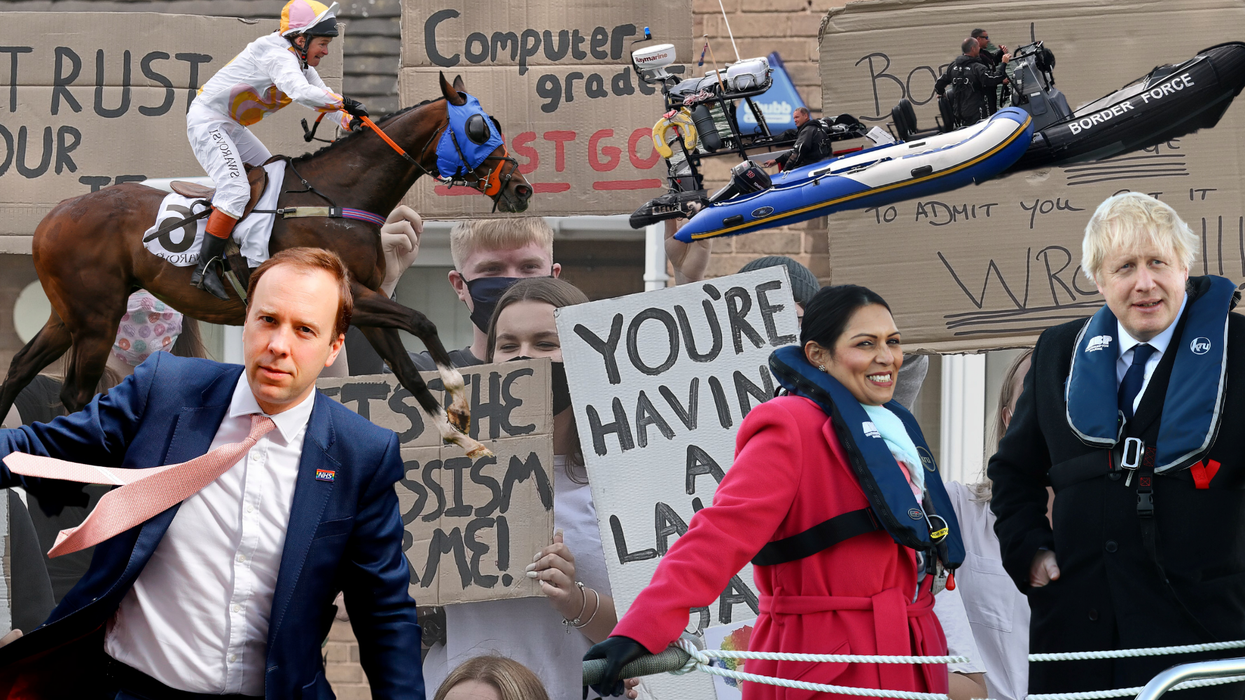Strangely, time during lockdown moves faster than seems possible.
So it’s all the more important to make sure we’re marking exactly what our government is doing. After all, the Tories wouldn’t want to be given carte blanche, would they?
No, Boris and co understand that effective leadership can only happen when politicians are held to account. And boy, has it been a week for accountability. Here’s seven awful things the Tories have been up to this week.
1. When Gavin Williamson did a massive U-turn on A Level results
Where to even begin here? The debacle began last week when thousands of A Level students discovered they’d been downgraded severely from predicted grades, for exams they’d never even sat. At fault was an algorithm that had ‘adjusted’ individual grades to create an artificial standardisation. However, the algorithm had biases baked into the code that penalised both students and schools, with state schools getting the sharpest end of the deal.
At first education secretary, Gavin Williamson insisted there would be no U-turn. But after furious protests, complaints from colleagues and even a letter from the headmaster of Eton, on Monday the U-turn arrived. A full one. The algorithm was out and predicted grades teachers had given were to be used instead. What's more, the cap on student intake that some universities are subject to has been lifted.
While this removed some immediate pressure, it now poses more problems. Students who’d already been rejected from their first choice universities tried to find out if the decisions could be reversed. Universities who received the most applications suddenly are buckling under the weight of an unprecedented number of students who will need accommodation and course places. And universities that depend on getting students through clearing or because they’ve missed their first offer, warned that they could go bankrupt if their intake was too low. None of these problems are anywhere near being solved and the crisis looks set to run on.
2. When Matt Hancock scrapped Public Health England and appointed an unqualified ‘friend’ to run the new body
Surprise news this week: health secretary Matt Hancock has decided to scrap Public Health England, an agency directly controlled by his department. Why? Apparently, because he wants a more effective coronavirus response. Fine. Except Hancock was the one leading PHE.
But it all got more farcical this week when a familiar face was announced as the new lead of the new organisation, called ‘Institute for Health Protection’. Baroness Dido Harding, who is currently leading the government’s faltering contact tracing programme, has been called up for the top job.
This is despite track-and-trace apparently failing to reach 40 per cent of all contacts they are supposed to.
Harding was also the head of TalkTalk when they suffered a major data breach in 2015, coming under heavy criticism for her response. Furthermore, her links to the government have prompted severe questions.
Not only is Harding a Tory peer, her husband, John Penrose, is a Tory MP and board member of the think tank 1828 who have been advising on scrapping PHE. Penrose, ironically, has also served as prime minister Boris Johnson’s ‘Anti-Corruption Champion’ since 2017. Clearly doing a great job.
3. When Sajid Javid took a job at a major bank despite remaining as an MP
Speaking of ‘anti-corruption’, it was announced this week that former chancellor Sajid Javid was getting a ‘side hustle’... at major bank JP Morgan.
Javid will be a senior adviser at the finance giant, in a role similar to that of Tony Blair. The MP for Bromsgrove will be sitting on JP Morgan’s Europe, Middle East and Africa advisory council, with his salary thought to be more than £2m a year.
Naturally, the fact he remains an MP whilst doing this job has left members of the public concerned about bias.
Even though Javid’s work will be “strictly governed” to make sure he doesn’t reveal government intel, the overlap between his brief in serving the public while simultaneously being on the payroll of a big business has sparked outrage.
Fellow MPs like Zarah Sultana said second jobs like Javid’s should “be banned”. They almost certainly won’t be.
4. When Priti Patel blamed ‘smugglers’ for the death of a migrant in the English Channel
After a concerted government push to police the English channel route for asylum seekers into the UK (which is perfectly legal, but dangerous), it was discovered that a 28-year-old migrant, Abdulfatah Hamdallah, had tragically drowned on Wednesday, attempting to make the journey.
Home secretary, Priti Patel tweeted her condolences, blaming ‘abhorrent criminal gangs and people smugglers who exploit vulnerable people”.
However, she quickly received pushback from experts in immigration, who told Patel that it was increasingly strict UK law and border controls pushing migrants into desperate action.
“NO,” replied Minnie Rahman, policy officer for the Joint Council for the Welfare of Migrants.
Speaking about the tragedy, Boulogne-sur-Mer’s deputy public prosecutor, Philippe Sabatier said that Hamdallah and a friend, who survived, had acted on their own initiative and there were no known links to smugglers.
5. When it was revealed that rough sleeping rose during the pandemic, despite claims the government had helped 90 per cent of homeless people off the streets
During lockdown, the government launched the 'Everyone In' initiatie to house rough sleepers who stood to face particular risk from Covid-19. The scheme was deemed a success; housing secretary Robert Jenrick declared in April that “90 per cent” of rough sleepers had been helped into safe accommodation.
But a new report by The Guardian painted a different picture this week. According to data from homeless charity Streetlink, there were increased alerts made about rough sleepers by members of the public, a trend that usually occurs in winter. In London alone, there was a 76 per cent increase in alerts.
While Matt Harrison, the director of Streetlink, said some of the rise in calls could be attributed to a more alert public, he also said the pandemic had given birth to a new cohort of rough sleepers, made homeless by losing their work and being evicted at the beginning of lockdown.
We know that more people sleeping rough were calling us because they were concerned about the pandemic situation and weren’t sure where to turn, particularly as the services and facilities that they normally relied on – including homelessness day centres, community centres and public toilets – had closed.
Further investigation also found that only a “fraction” of rough sleepers housing during the Everyone In scheme had been permanently re-homed and many had been evicted from their temporary accommodation.
Meanwhile, with the ban on property evictions set to end on 23 August, there are also fears many more will find themselves without a home.
A mess.
6. When a literal Lord said A Levels ‘don’t matter’ because failing taught him to ‘hustle’
Quick story: the fifth Lord Bethell, who attended Harrow, then the University of Edinburgh before eventually succeeding to his hereditary peerage titles, decided to comfort disappointed A-Level students by telling them the story of how he “fluffed” his levels but succeeded despite this.
Yes, and the titles and the money and the private education probably had nothing to do with it at all.
7. When an immigration detention centre was ‘repurposed’ to ‘home’ asylum seekers
Yarl’s Wood became an infamous symbol of the UK’s stringent and draconian immigration laws; it was a detention centre solely for women that was subject to intense press attention over the last few years.
Campaigners had long wanted it shut down, with former detainees describing the conditions there as “like hell” and that it is “not a place for a human being”.
Good news this week: Yarl’s Wood is no longer a detention centre (officially).
Bad news: what was an immigration prison is now being “repurposed” to house asylum seekers who have come here perfectly legally (as had many former Yarl’s Wood detainees).
As a result, many are questioning why a place deemed “inhumane” could be seen as a fit space to make refugees fleeing life or death situations feel safe.
Bella Sankey, director of migrant rights NGO Detention Action, called the move “unfair and unjust”.
See you all next week.













